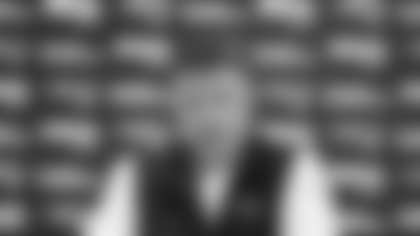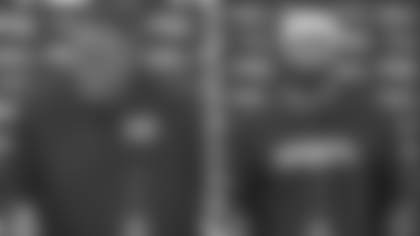[wysifield-embeddedaudio|eid="387096"|type="embeddedaudio"|view_mode="full"]HEAD COACH BILL BELICHICK
Q: Patrick Chung made a great play on a deep ball in the red zone on Chris Hogan, and Devin McCourty made a great play breaking up a potential touchdown pass to LeSean McCoy. What did you see on those plays and how did you think your safeties performed?
BB: Really pretty much as you described it. I thought that Chung made a good play on the ball there when he kind of saw the receiver's hands go up – Hogan's hands go up – came up with his arm and got the ball and the hand and all that. It was kind of a bang-bang play, which is what you can do in that situation. You can't obviously grab the guy early, but I thought he played pretty good technique on that showed patience and just raised the receiver's hands when he went up for the ball. Devin showed good awareness of kind of the matchup there with McCoy on the linebacker, and he got a good jump on the ball as he usually does, saw the matchup and was able to get over the top on that. So that was two good plays by those guys and they obviously saved us a lot of points, or saved us four points.
Q: Tavon Wilson got quite a bit of playing time last night. What did you think of his performance?
BB: Tavon has worked hard all year. We have a lot of competition at that position. He had an opportunity to play more last night and I thought he did a good job with it, really played some corner-type positions for us depending on the exact scheme, what we were in and how it matched up with Buffalo and so forth. But he did a good job. Tavon works hard, very good team player always, has been one of our practice players on multiple occasions this year. He does what he can to help the team, whether it's on defense or in the kicking game or in practice or just sharing his experience with younger players, that kind of thing. But he's done a good job for us and he came through last night when we really needed him, as did a lot of other guys. That was big for us last night.
Q: Is today the deadline on Chris Jones and Dane Fletcher? If so, what is the decision there?
BB: Yeah, it's either today or tomorrow. I'm not sure which exactly. I'll have to double check with Nick [Caserio] on it. But we'll follow through with those in a timely fashion and let you guys know what they are once those transactions are made.
Q: Do you have any sense as to the severity of the injuries to Danny Amendola and Aaron Dobson?
BB: No, we're less than 24 hours from the game, so we'll give everything a chance to try to sort it out. We'll list them on the practice report based on where they are on Wednesday. I know everyone wants instant diagnosis, but really it doesn't always work that way.
Q: This is the fourth year that Josh McDaniels has been back as offensive coordinator. How have you seen him grow in that role since 2012?
BB: All good. Josh does a great job and he has, he's come back and continued to do a great job for us. Yeah, probably better with a little bit more experience, but he's always been really well prepared, focused, does a great job play calling, has a lot of poise on the sideline, is very good at making in-game adjustments and recognizing what the problems are, how to address them or fix them or where the weaknesses of the defense are and how to attack them. Hopefully we have those things in our game plan, but sometimes we need to make a modification somewhere along the line either in-game or if it's a little more complex thing maybe it's at halftime, but he does a good job in all those areas. Coaching staff, working with Matt [Patricia] on the defense and how they've helped each other or worked with each other, he does a great job there, too. We're really lucky that we have him and have him back. He's done a great job for us in all those areas really. He's a very consistent, dependable guy that's always prepared, gives you a solid performance every day, not just on game day or some other day, good decision maker, really smart, can process a lot of things at the same time and come out with the right answers, even though there's several other things going on or balls in the air if you will.
Q: How does mental toughness play into a game like last night? What did you think of the offensive line's play?
BB: Well, I don't think there's any way to understate the importance of mental toughness. It's a long season. Every game is competitive. Every team has got good players, good coaches, good schemes. There are always challenges to overcome every week. Every day is a competitive challenge to try to prepare harder and better and do more than your opponent is, even though you're not facing them on the other side of the field yet. We're in our separate locations, but there is still a competitive race to have everything done and be in the best possible place when the game starts from a preparation standpoint. So it's not easy and mental toughness is a big part of that, being able to sustain it, deal with whatever the ups and downs are, whatever the distractions are, all the things that could get in the way of your performance, some of which are out of our control, controlling the ones we can control but not getting distracted by the ones that are out of our control and doing a good job with all those things, too. I don't think that can be understated. Offensively, in general there wasn't a very consistent performance in any area. We didn't throw the ball particularly well. We didn't run it particularly well. We've got to do a better job of all that. We've got to coach better. We've got to block better. We've got to get open. We've got to run better. We've got to do everything better. It just wasn't the kind of production or offensive performance we were looking for. That being said, we had enough production to win and certainly it was a good complementary game from the plays we got from the kicking game, from the defense, and we had the one turnover offensively but that didn't really hurt us as much as it could have because the field position they ended up with was not very good. It was kind of similar to a punt if you will, so it wasn't one of those devastating turnovers, so overall our ability to take care of the ball and take advantage of some of the opportunities that we had, although we were only one-for-three in the red area, we left some points on the field, weren't very good on third down, but we still had 350 yards of offense. So we moved the ball some, but again there were just too many inconsistent things, not enough production in some of the critical areas that we needed to be. We've got to do everything better on offense. I don't think it was one guy or one position. We had issues everywhere at one time or another.
Q: Is that where the resiliency comes in?
BB: Yeah, absolutely, we're not going to go out and score 50 points every week and shutout the opponent every week. We've got to battle through some bad plays, bad calls, bad coaching calls, whatever it is, and find a way to make it work and find a way to win. That's a big part of the mental toughness and resiliency, no question about it.
Q: The Denver Broncos are leading the league in a lot of defensive categories. Have you had a chance to look at their front yet and see what type of challenges they will bring Sunday night?
BB: Definitely seen them, absolutely spent a lot of time on them and of course it's really been all Denver today, so good football team, very good defensively and got an outstanding front and a lot of disruptive players there both inside and outside, really good edge players – [DeMarcus] Ware, [Von] Miller, [Shaquil] Barrett, [Shane] Ray, [Lerentee] McCray – they've all shown up. Disruptive guys inside – [Derek] Wolfe and Malik Jackson, [Sylvester] Williams, [Vance] Walker – they've got a lot of them. So, some blitzing by the linebackers, but not a lot. They get a lot of pressure from their down guys and when I say linebackers, I really think of Von Miller and those guys as defensive ends. They might be listed as linebackers in the program or Ware or whatever, but those guys are really … But you include them, the outside linebackers, with the front – those five players, whoever they are – and they rotate them through. There is a lot of pass rush there. Wade [Phillips] does a good job of combining that with tight man coverage so there is not a lot of time for the receivers to get open. There aren't a lot of easy throws for the quarterback where the defense is playing 10 yards off them, so you've got to get open, quarterback has got to get rid of the ball, the offensive line has got to block some good pass rushers, but in order to be successful throwing the ball all those elements are going to have to be in place. And they do an excellent job of all of them. They rush well. They cover well. You don't have all day and they're well coached and they've got good players.
Q: What went into the decision to replace David Andrews with Bryan Stork in the first half and how did you think the combination of those two looked?
BB: Well, we played all seven players on the offensive line, all three tackles and all four inside guys. Stork is still working his way back from the time he missed in training camp and the early part of the season, so trying to work him back in there some, too, along with David and Shaq [Mason] and Josh [Kline]. At some point Tre' Jackson, whenever that happens, whenever he's ready, we'll see how that goes. I think the bottom line again as we talked about on an earlier question, just totally as an offense we've got to do a better job. It definitely starts up front – communication, execution, run blocking, pass blocking, blitz pickup – I mean, you name it, everything we've got to do a better job than we did last night and that's everybody. We'll get to work on it.
[wysifield-embeddedaudio|eid="387101"|type="embeddedaudio"|view_mode="full"]OFFENSIVE COORDINATOR JOSH MCDANIELS
Q: How do you feel you've grown as a coach from when you left New England to now? What did you learn from your time away
JM: I think there are a lot of things that I've learned certainly over the last four to five years, probably too many to name them all now. But I just think you get an opportunity to see how other people in this league think and do things. There are different ways people go about trying to win. There are a lot of different backgrounds that coaches and players are coming from, and it gives you a lot of appreciation for I think the difficulty of the team-building process because you have so much to do and not a whole lot of time to do it. I think you need tremendous leadership. You need a consistent vision of what you're looking for whether it's offense, defense, special teams, the entire organization, and I think it gives you a great idea of how much the relationship that you have on a daily basis really goes into formulating the type of place you're going to have. I didn't have a long time there in Denver, but really met some great people. And I have a tremendous amount of respect for their organization and the things they believe in and certainly [Pat] Bowlen for the opportunity he gave me when I was there. I wish we would've done better, but again, I've learned a lot of different things after that experience looking back on it. And hopefully it's made me a better person and a better coach at the same time.
Q: Have you ever encountered a scenario before where you were down to just two healthy receivers? How challenging was that? Going forward, how challenging will it be?
JM: I'm not sure if I've ever been in a situation where we lost two in the same game, but we've had to be prepared and ready for that many times. I know last year in particular and maybe once this year already, we've actually gone to the game with four total receivers. And we understand Matthew [Slater's] role is significant in the kicking game. He's not a guy who you can just take off of those units because of his impact there and put him on offense and not have him participate in the kicking unit. So there have been some games where we've gone in with really three offensive-type receivers where you've got to have some things to back it up with whether that be tight ends or backs. That's basically what we did last night, and I think each week you certainly can't be shortsighted. You've got to have an idea of what you may do if you encounter an injury at any position. So that's why our players get opportunities in practice even if they may not end up doing them in the game, because they have to be ready at a moment's notice, including the guys on the practice squad. You have to be flexible. I think our players handled that really well, just making a lot of adjustments on the sidelines. And then Chad O'Shea always does a tremendous job of, "OK, this guy is down. Now here's how I'm going to handle these things." He usually gets on top of that before I even have to say anything, so I think having a staff that is as experienced together as we have and players that are … Changing roles and having different identities from one week to the next I think helps that whole process out. And this week is not going to be any different. You always have questions about who may or may not be able to play. You have to put a game plan together with some potential contingency plans in place, and as the week kind of shakes out and unfolds, you just have an opportunity to maybe kind of center in on what you can and can't do by the time the game comes around. That's a very normal occurrence at this time in the year.
Q: Is there a general scheme that Wade Phillips follows?
JM: Coach Phillips is certainly a tremendous coach that we've had the opportunity to compete against many times against different teams that he's been with. It's always difficult to prepare for him. He applies a lot of pressure to the offense, not always by blitzing, but he blitzes a lot. This is a team that will blitz as much or more than any team we'll play all year without question. So they've got very talented players – they've got them in the front, they've got them in the linebacking corps, they've got them in the secondary. This is as deep a team as we'll play, as talented a team as we'll play, and Coach Phillips usually does a tremendous job in putting those guys in position to do things that they do very well. So they're going to put pressure on you to try and execute. They don't give up very many easy plays. They certainly don't give up many big plays. They try to create turnovers, and they do a great job of that. So this is a game where you certainly have to try and limit your mistakes as best you can. You have to try to stay out of long-yardage situations, which is difficult because they do a good job of trying to stop the run, getting after the quarterback. So it's going to be a challenge on every play to execute and identify what they're doing and try to continue to make positive plays and move the football on Sunday night. So I've got a tremendous amount of respect for Coach Phillips, the entire staff that they have there, the players and the way that they play. This will be as big of a challenge as we've had all year.
Q: How many of the shallow crossing routes that you run are by design and how many are routes based on maybe a blitz coming?
JM: A lot of what we try to do is avoid those types of situations where we're forced to throw it quickly, but there are certainly situations that come up in each game where that may be the case. So we call our fair share of them, and at times we have to adjust and do things because the defense has forced us into those situations. As many times you can in a game, you try to do things on your terms – I think that's the key – and not be forced into doing something and being dictated by the defense. But any success we have with schemes goes back to the execution by the players. So they do a good job of learning how we want things done, and there's no defense that makes running those things easy. So ultimately, it comes down to our preparation, our practice execution and then carrying that into the game and being able to do it under pressure against tight man coverage, against zone, against blitz, against four-man rush, three-man rush. I think a few of those last night, we ended up with three-man rush. Some of them we ended up with six or seven of them coming at us, so a lot of different scenarios that could come into play. And ultimately, those are timing things and trust. There's a trust element to those things that is very important because it's such a quick type of a play that the receiver, tight end or back and the quarterback need to be on the same page when we're using those things.
[wysifield-embeddedaudio|eid="387106"|type="embeddedaudio"|view_mode="full"]DEFENSIVE COORDINATOR MATT PATRICIA
Q: What traits do you see from Brock Osweiler that might differ from Peyton Manning?
MP: Definitely with Brock out there at the quarterback position this past weekend and then in previous [games], I think Coach [Gary] Kubiak and Coach [Rick] Dennison, really they have a guy that they're going to try to run their type of offensive system, be able to move the pocket a little bit, get him out, use the boots and the play-action passes. There are still a lot of similarities. Obviously Peyton Manning's a great quarterback and the run game is steadily Kubiak's run game. They've got the stretch runs and the cut backs and the zone schemes. He's been so productive with that running game and all the backs that he's had through the years in Houston and then at Baltimore last year that have just come into that system and been able to be very productive with it. You really saw that come into effect this past weekend in Chicago. They ran the ball very well and I think that's what they're trying to get back to, is running the ball well and then setting up the play-action and boot game with it. Peyton Manning obviously has a great system in the pass game that he's been able to incorporate there. Osweiler definitely did a good job with the game plan pass-patterns that they've put in, hit some receivers downfield, hit some big plays and then from a skill standpoint once you get the ball in the hands of their skill players it's very dangerous. They break a lot of tackles. They get a lot of yards after catch. They just create plays in space and tackling is a huge issue with this team. This is a very dangerous offense. They have people in the right spots to make big plays and I think the quarterback position here in this offense does a good job of trying to distribute the ball and get it to all the different playmakers that they have available to them.
Q: What has been the biggest key to your defense having the success that they've had thus far this season?
MP: Well, you know, I mean for us it's the same every week. We're just trying to get better, trying to improve, and trying to do the things that we didn't do so well last weekend, or last night in this case, and try and do them better next week. Just in general with our guys on defense, just give all the credit to the players for their work ethic. I think they come in every week and they work extremely hard to really try to study the opponent, really get the game plan down, be good students of the game and try to execute what we're asking them to execute. They work tirelessly at it. I think our guys just really attack the game from that standpoint. To be honest with you, the assistant coaches that I have, the position coaches that go out there and work with these guys every day and implement the game plan and the fundamentals and the techniques do a phenomenal job and just collectively as group understanding it's a process each week. We're trying to work hard every week and each day to get better and then work during the game to make sure we stop whatever the offense is doing. This last week players did a great job, coaches did a great job of just trying to prepare and get ready but there's certainly so much to improve on from last night. We've got to play better and obviously get better for another game, another really tough, challenging game this week. Our big thing is just trying to improve, trying to work to get better each week, and understand what we're seeing from the opponent and trying to do our best to stop it. Really just that's our focus.
Q: What have you seen from Brandon King this season?
MP: Just in general, I think you're talking about a guy that's really working hard to understand our system and what we do here from a daily operation defensively and on special teams. [He] does a great job for us in his effort and his execution. He's really tried to learn. I think he's a young guy who is working really hard to try and make himself better and he's doing a great job for us on special teams and trying to learn the defense in the process. [He's] just buying into what we're trying to do here and understand that it's a grind to kind of push through and to improve. I think that's the biggest thing for him, is just attacking it and approaching it the right way.
Q: How does the lack of tape available on Brock Osweiler affect your study and game preparation for him?
MP: Certainly we'll just try and pull all the film we can on him, get all the tapes, get a chance to take a look at him and his play-style. I think it's really about the system. It's about what they try and do as an offense and what the quarterback's role is in that offense. You're going to look at the tape as much as you can to try and get an idea of what he is from a player standpoint and his physical attributes from there, and then put that into the system with Coach Kubiak and Dennison and understand how they're going to incorporate him into that and what they're going to ask him to do.
Q: How pleased were you with the performance of your safeties in the red-area against Buffalo last night and in particular how did you feel Tavon Wilson performed in coverage?
MP: Like I already said, generally the defense, we try and get better and obviously the red-area is a huge point of emphasis for us. When the ball gets down there we've got to do our best ability to keep them out of the end zone. Those are what we call "four-point plays" or in some cases could be a seven-point play if we can get it turned the other way. It's a critical part of the field. We really try and make sure that the point of emphasis is on all the fundamentals and the game plan calls and the communication. That's really the biggest thing for our safeties as group is to understand the communication down there and make sure that we're on the same page and that the coverage is handled from that standpoint. I think those guys are doing a great job of trying to get better and the red-area is something we really try and put a big point of emphasis on and it's a critical part of the field and each play is worth points. I think those guys, all of the safeties, and all of the defensive backs and linebackers, are guys that are in coverage down in the red area and understand how critical that is and really have to do a great job of being fundamentally sound with their technique and understand where they are on the field.
Q: Does the defense feel any extra pressure to make an impact on the game to help shoulder some of the responsibility from the offense and their injuries?
MP: For us defensively, every time we step on the field we're just worried about trying to stop our opponent. I think one of the things I try to do here is play a team game and we understand that we've got to do our job first and foremost and everyone else around us will do their job. That's the most important thing for us. We can't control anything else other than what we can control, so when we step out on the field we're just trying to stop our opponent no matter what the situation is. It's a team game. That's what's so great about this game is there are different highs and lows for everybody on the field and everyone takes care of each other and goes out and works as hard as they can. That's what we're trying to get done. For us, we're just focused on the opponent's offense and trying to stop them. That's hard enough for us.
Q: Coach Belichick mentioned your intelligence when it came to engineering and said that you could probably build your own airplane. Have you ever tried to do that and what does it mean to have that sort of respect from him?
MP: We're going to skip the first part of that question. I'm just trying to figure out Denver's offense right now and how to stop them. Coach Belichick has been great to me. He's a wonderful mentor and a great friend. I'm extremely lucky to be here and to work for him and I just try to learn as much as I can every day that I walk into this building. [I'm] just really blessed to be here.






































